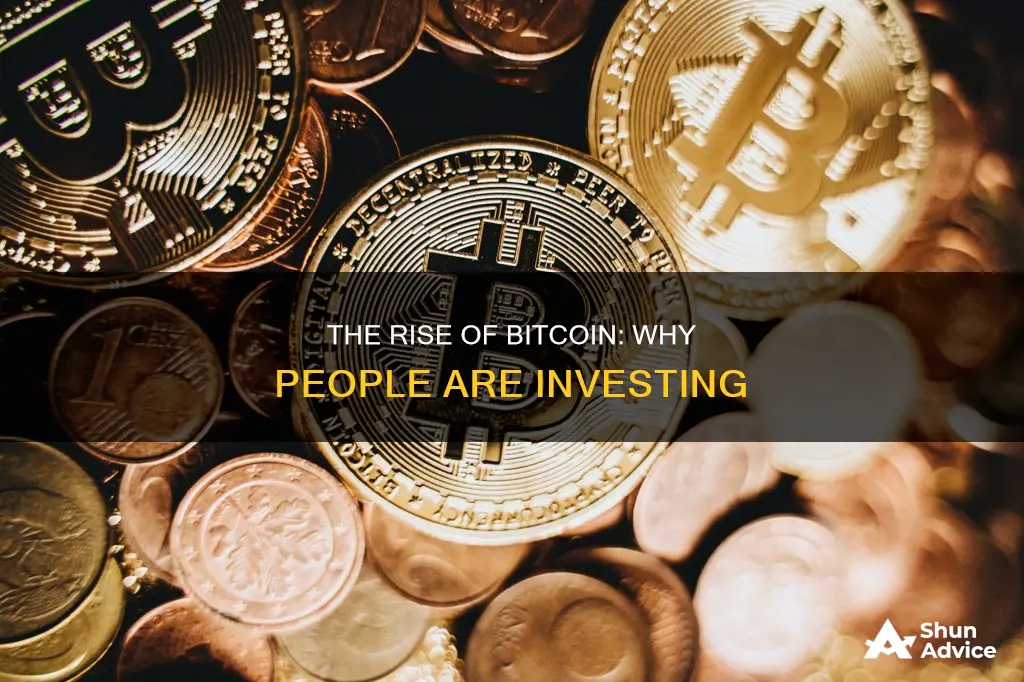
Bitcoin has been one of the best investments in the world since its creation in 2009. However, it is a very volatile asset, and its price can fluctuate wildly. For example, in 2022, the price of Bitcoin plummeted by about 60%. Despite this, some people still see Bitcoin as a good investment. In this article, we will explore the reasons why people are investing in Bitcoin.
| Characteristics | Values |
|---|---|
| Volatility | Bitcoin's value can fluctuate extremely in a short period of time. |
| Speculation | Bitcoin's value is based on speculation and investor sentiment. |
| Inflation | Bitcoin is seen as a hedge against inflation due to its fixed supply. |
| Diversification | Bitcoin has a relatively loose correlation with other asset classes, making it a potentially attractive tool for portfolio diversification. |
| Scarcity | Bitcoin has a limited supply of 21 million, making it increasingly scarce over time. |
| Regulation | Bitcoin is loosely regulated, but this could change as it gains popularity. |
| Adoption | Bitcoin is the world's most popular and valuable cryptocurrency, with growing adoption. |
| Performance | On a long-time horizon, Bitcoin is one of the best-performing assets. |
What You'll Learn

Bitcoin's value proposition is suited to the macro climate
The current crisis has been exacerbated by the actions of central banks, which have been forced to aggressively raise interest rates to combat rising inflation. This has resulted in a positive correlation between Bitcoin and stock prices in 2022, which is troubling for investors. However, with central banks considering further quantitative easing, hard assets such as Bitcoin are expected to perform well.
Bitcoin's scarcity is often cited as one of the reasons for its potential to store value and act as "digital gold". The Bitcoin halving, which occurs approximately every four years, reduces the rate at which new Bitcoins are created, leading to increased scarcity and potentially driving up demand and prices. The next Bitcoin halving is expected in 2024, and historical data shows that previous halvings have been associated with bull markets.
Additionally, Bitcoin's decentralised nature and fixed supply make it resistant to manipulation, tampering, and fraud. It also provides a way for people worldwide, especially those living in underbanked regions or countries with unstable financial systems, to protect their wealth and gain access to critical financial services.
Bitcoin's Early Investors: Unimaginable Wealth and Opportunities
You may want to see also

Bitcoin is still in the buy zone
Bitcoin has been on a rollercoaster ride lately, with its value skyrocketing to unprecedented heights before plummeting by about 15% in a single day. Despite this volatility, there are several reasons why Bitcoin is still an attractive investment opportunity and remains in the buy zone.
Firstly, the next Bitcoin halving is approaching, which occurs approximately every four years and reduces the rate at which new Bitcoins are created by half. This scarcity aspect makes Bitcoin an appealing store of value and increases its potential to act as "digital gold." The halving also controls Bitcoin's inflation and can lead to increased demand, driving up its price.
Secondly, Bitcoin's value proposition is well-suited to the current macro climate of bank failures, government bailouts, and quantitative easing. As a decentralised and secure digital currency, Bitcoin offers a way for people worldwide to protect their wealth and gain access to financial services, especially in underbanked regions or countries with unstable financial systems.
Thirdly, Bitcoin has proven to be one of the best-performing assets on a long-term horizon. On a 3-year timeframe or more, Bitcoin has outperformed most other investments, reflecting its potential as a dependable store of value. Companies like MicroStrategy and Square have recognised this and made significant investments in Bitcoin, with Square stating that "Bitcoin has the potential to be a more ubiquitous currency in the future."
Lastly, the potential approval of a Bitcoin Spot ETF by the SEC would be a significant step in the legitimisation of Bitcoin as an asset class. If approved, it would open the door for more mainstream investors to gain exposure to Bitcoin, potentially leading to substantial inflows of capital.
In conclusion, while Bitcoin is a highly volatile and speculative investment, it still presents a favourable risk/reward profile for buyers/investors. Its scarcity, decentralised nature, strong long-term performance, and potential for increased institutional adoption make it an attractive addition to one's portfolio, especially when purchased during the buy zone.
Litecoin Cash: A Smart Investment Move?
You may want to see also

On a long timeframe, Bitcoin is the best-performing asset
Bitcoin has been the best-performing asset of the last decade, with a cumulative gain of over 20,000,000% since 2011. This is a remarkable return on investment, far outpacing the gains of the US Large Caps and NASDAQ 100, which recorded returns of 3,282% and 541% respectively.
Bitcoin's annualized return in that period was 230%, which is ten times the amount of the NASDAQ 100, the second-best performing asset class of the last decade. In comparison, US Large Caps recorded an annualized return of 14%, and gold, an asset that has proven to hold value over long periods, recorded an annualized return of 1.5%.
Bitcoin's performance is even more impressive when compared to other individual stocks. For example, if you had invested $100 in Netflix a decade ago, you would have seen a return of about $4,011. However, if you had invested the same amount in Bitcoin, your return would be over $18 million.
Bitcoin's volatility is well-known, and it has seen some significant spikes and drops. However, its high-risk, high-reward nature has proven to be a lucrative investment for many. Despite the risks, Bitcoin's long-term performance has been impressive, and it has become an asset worth holding for many investors.
Bitcoin's scarcity is one of its key advantages. Only 21 million Bitcoin will ever exist, and its decentralised, borderless, and verifiable network, made possible by blockchain technology, ensures no central oversight. The adoption of Bitcoin has grown significantly, with users increasing from 30 million to nearly 90 million in the last five years.
While Bitcoin may not be a mainstream investment yet, and it doesn't generate cash flow like traditional investments, its impressive long-term performance and potential for high rewards make it an attractive option for investors looking to diversify their portfolios.
Tai Lopez's Guide to Bitcoin Investing
You may want to see also

A Bitcoin Spot ETF may be approved
Bitcoin has been one of the best-performing assets over the last decade, rising from a relatively obscure peer-to-peer payment network to a global phenomenon. As the original cryptocurrency, Bitcoin has spurred an entirely new asset class that now has over $1 trillion in market capitalization.
The extreme movements up and down are relatively common for Bitcoin and are expected to continue. Financial experts advise people looking to invest in Bitcoin to allocate a small amount of their portfolio that they would be okay with losing entirely to the asset.
On 10 January 2024, the US Securities and Exchange Commission (SEC) approved the first-ever spot Bitcoin ETFs, including those from Fidelity, BlackRock, and Invesco. In total, the SEC approved 11 spot Bitcoin ETFs, and 10 of them started trading on 11 January 2024.
A spot Bitcoin ETF is an exchange-traded fund that directly tracks the price of Bitcoin, primarily by holding a large amount of the cryptocurrency itself. It is similar to a spot gold ETF, which holds physical gold bullion on behalf of its shareholders.
- Increased liquidity: With ETFs buying and selling large blocks of Bitcoin based on demand, this could increase liquidity and help stabilize prices over the long term.
- Increased prices: While a spot Bitcoin ETF does not directly affect the price of Bitcoin, the increased demand and purchasing of Bitcoin by these ETFs could boost the price over time.
- Lower trading fees: With more adoption and ease of access through a spot ETF, investors may be able to access Bitcoin with lower trading fees than some crypto exchanges.
- More regulation: Spot Bitcoin ETFs are highly regulated securities that are now tied to the price of Bitcoin. Any regulatory actions in favour of Bitcoin could positively affect the price of spot Bitcoin ETFs and Bitcoin itself.
- Ease of access: Considering the hoops one has to jump through to own Bitcoin (exchange accounts, digital wallets, private keys, network transfers, etc.), a spot Bitcoin ETF is one of the easiest ways to add Bitcoin exposure to your portfolio.
- Positive impact on Bitcoin's price: The approval of spot Bitcoin ETFs will have a positive impact on the price of Bitcoin as more investors gain exposure to it.
However, it is important to note that investing in a spot Bitcoin ETF comes with risks, including volatility and annual fees. Additionally, investors don't take direct custody of Bitcoin when investing in a spot Bitcoin ETF.
Bitcoin or Ethereum: Where to Invest Your Money?
You may want to see also

The next Bitcoin halving is approaching
Bitcoin halving, a significant event in the cryptocurrency world, is expected to occur in 2028, and it will have a substantial impact on the Bitcoin ecosystem and market. This event, which happens approximately every four years, involves reducing the block reward or the number of new Bitcoins created by 50%. This mechanism is built into the Bitcoin protocol by Satoshi Nakamoto, Bitcoin's creator, to limit Bitcoin's total supply and increase its scarcity.
The next halving will decrease the block reward from 3.125 Bitcoin per block to 1.625 Bitcoin per block. Bitcoin halving has several implications for the Bitcoin network and its users, miners, and investors.
Miners
For miners, who are responsible for validating transactions and securing the network, the halving event will result in reduced mining rewards. This decrease in rewards will make mining less profitable, especially for smaller miners, as the large-scale mining facilities required to stay competitive are costly to maintain and operate. As a result, there may be consolidation in the mining industry, with individual miners and small outfits dropping out or being taken over by larger players.
Investors
Bitcoin halving is a highly anticipated event for investors, as it has historically led to an increase in Bitcoin's price. The reduced supply of new Bitcoins entering the market increases scarcity, which can drive up the price if market conditions remain the same. However, it's important to note that the impact of halving on Bitcoin's price is not immediate and that other factors, such as market sentiment and macroeconomic conditions, also play a role.
Consumers and Retail Bitcoin Users
The value of their Bitcoin holdings and remittances will be affected by the halving event, as the price of Bitcoin may fluctuate.
While Bitcoin halving is generally considered positive, it also carries short-term risks, including increased market volatility and temporary price corrections if market expectations are not met.
As the next Bitcoin halving approaches, it is crucial for all stakeholders in the Bitcoin network to stay informed and consider their risk tolerance and investment goals when making decisions.
Gemini Bitcoin Investing: A Step-by-Step Guide
You may want to see also
Frequently asked questions
Bitcoin is a good investment if you want exposure to the demand for digital currency. However, it is a risky investment and you could lose all your money.
No, Bitcoin is not a safe investment. It is subject to huge swings in price and is based purely on speculation.
The risks of investing in Bitcoin include volatility, an unproven rate of return, and fraud. Bitcoin exchanges are vulnerable to hacking and other criminal activity.
Bitcoin has a relatively loose correlation with other asset classes, making it a potentially attractive tool for portfolio diversification. It also has a fixed supply, so investors will not be negatively impacted by dilution.







